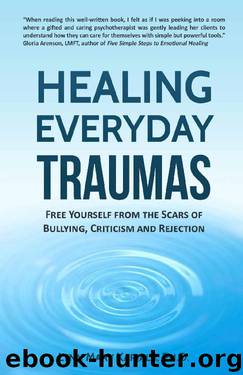Healing Everyday Traumas: Free Yourself from the Scars of Bullying, Criticism and Rejection by Lynn Mary Karjala

Author:Lynn Mary Karjala [Karjala, Lynn Mary]
Language: eng
Format: epub
Publisher: Psychology Innovations
Published: 2017-05-24T22:00:00+00:00
CHAPTER 7
Learning to Recognize Your Own Critical Voice
THE FIRST STEP in taking back control from your critical voice is learning to recognize it. Some people find that it’s fairly easy to see at least some of its machinations, once they have an idea of what they’re looking for. For others, however, it’s more difficult. The critical voice is sneaky and can be very good at disguising itself.
Try Looking Outward First
If you’re having trouble recognizing your own critical voice, it may be easier if you look outside of yourself first, especially for the type of person whose critical voice is out front. One fun way to practice this skill is by looking at fictional characters. One of the most famous characters in literature who fits this profile is Ebenezer Scrooge from Charles Dickens’ A Christmas Carol. Scrooge (before his transformation) is portrayed as stingy, mean-spirited, cynical and pessimistic. He asks at one point if the debtors’ prisons and workhouses are still in operation. When he’s told that some poor people would rather die than go to such places, his infamous reply is, “Then they had better do it, and decrease the surplus population.”
Another familiar character from classic literature is Eeyore, a stuffed donkey who is Winnie-the-Pooh’s friend in the stories by A. A. Milne. He’s consistently gloomy, pessimistic, and critical of many of the other characters. One of his best-known expressions is, “Good morning, Pooh Bear. If it is a good morning. Which I doubt.”
Archie Bunker from the 1970s show “All in the Family” was quite possibly television’s most famous bigot. Blacks, gays, liberals, Jews, Catholics and many others were all targets of his vociferously expressed, negative views. He called his wife, Edith, a “dingbat,” and his favorite nickname for his son-in-law was “Meathead.” He was actually not an evil character, and there were times in the series that he was able to move beyond his narrow, ill-natured views, but his suspiciousness and faultfinding were immediately apparent to the viewer. (Interestingly, there was one episode in which Archie admitted that his father was physically and emotionally abusive. That detail of his backstory fits well with our understanding of why the child of a bully may give power to his own critical voice and become a bully himself.)
In more recent culture, the character of Red Foreman from “That ’70s Show” is another excellent example of a person whose critical voice is very much in evidence. He was often harsh and judgmental toward the young people in the show, especially his son, Eric, apparently in the belief that he had to toughen him up to “make him a man.” On many occasions, he called Eric a wimp, a “dumbass” and similar epithets. He was disparaging, even contemptuous, of other adults as well, including his neighbors. Unlike Scrooge, though, Red also had a softer side; it did become clear over time that he loved his wife and children, and the protector quality of his critical voice shone through, if rather infrequently.
With these personalities in mind, take a little time to think about your favorite books, movies and TV shows.
Download
This site does not store any files on its server. We only index and link to content provided by other sites. Please contact the content providers to delete copyright contents if any and email us, we'll remove relevant links or contents immediately.
| Acupuncture & Acupressure | Aromatherapy |
| Ayurveda | Chelation |
| Chinese Medicine | Energy Healing |
| Healing | Herbal Remedies |
| Holistic | Homeopathy |
| Hypnotherapy | Massage |
| Meditation | Naturopathy |
| Reference |
Inner Engineering: A Yogi's Guide to Joy by Sadhguru(6796)
The Power of Now: A Guide to Spiritual Enlightenment by Eckhart Tolle(5782)
Fear by Osho(4740)
Ikigai by Héctor García & Francesc Miralles(4274)
The Art of Happiness by The Dalai Lama(4130)
The Ultimate Bodybuilding Cookbook by Kendall Lou Schmidt(3945)
Yoga Therapy by Mark Stephens(3749)
The Little Book of Hygge by Meik Wiking(3694)
The Healing Self by Deepak Chopra(3580)
Why Buddhism is True by Robert Wright(3453)
The Hatha Yoga Pradipika (Translated) by Svatmarama(3342)
Being Aware of Being Aware by Rupert Spira(3276)
Shift into Freedom by Loch Kelly(3199)
Wild Words from Wild Women by Stephens Autumn(3153)
Work Clean by Dan Charnas(3123)
Happiness by Matthieu Ricard(3049)
More Language of Letting Go: 366 New Daily Meditations by Melody Beattie(3030)
Yoga Body & Mind Handbook by Jasmine Tarkeshi(2880)
Why I Am Not a Feminist by Jessa Crispin(2760)
